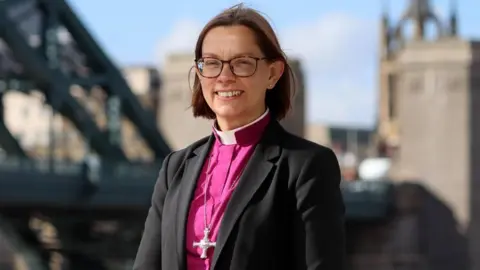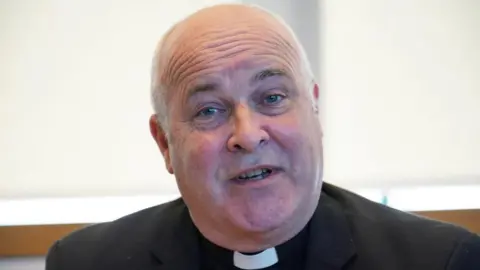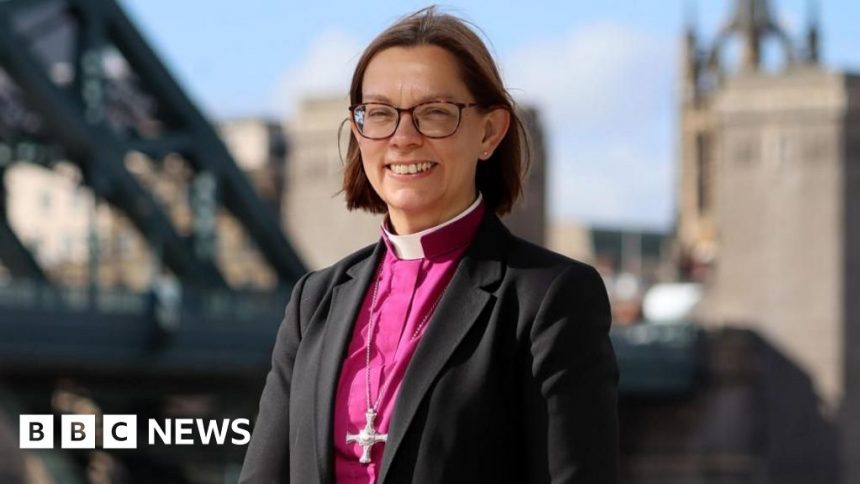Archbishop of York ‘wrong person’ to lead reform, says bishop
 Diocese of Newcastle
Diocese of NewcastleArchbishop of York Stephen Cottrell is the “wrong person” to bring much-needed reform to the Church of England, the Bishop of Newcastle has told the BBC.
Helen-Ann Hartley has repeated her call for Mr Cottrell to resign after he faced criticism last year for his handling of a sexual abuse case.
On Monday, Mr Cottrell will lead a meeting of the General Synod – the Church’s governing body – which will discuss changes to safeguarding measures.
Mr Cottrell has stepped in as head of the Church while it looks for a replacement for Archbishop of Canterbury Justin Welby, who stood down last year after a report criticised his and the Church’s handling of the prolific child abuser John Smyth.
Bishop Hartley was the first senior member of the clergy to call for Mr Welby’s resignation after the report into the Smyth case was published.
She said she is now viewed as a troublemaker by some of her colleagues in the clergy, with one branding her as the “Bishop of Negativity”.
“I think that’s really sad,” she said, adding that she believed others may have joined her in speaking out if “fear” had not stopped them.
The synod is expected to hold significant discussions about safeguarding measures this week, after the Church faced criticism for its handling of child abuse spanning decades in a scathing report last year.
Also known as the Church’s parliament, the General Synod meets up to three times a year to debate and pass measures governing how the Church works. It is made up of 478 members who are elected every five years.
Past General Synod meetings have had major repercussions. In 2008, it voted to ordain women as bishops, and many recent meetings have included discussion of same-sex marriages.
Victims and survivors of abuse, along with several members of the clergy, have called for safeguarding reform, and the subject has been placed on this week’s synod agenda.
The Archbishop of York has pledged to do all he can to bring about independent scrutiny of safeguarding, and he used his Christmas Day sermon to say the Church must be “changed”.
But Bishop Hartley said Mr Cottrell was not the right man to oversee the process.
“I do not think that it’s appropriate for the Archbishop of York to be in post, and certainly to be leading change that the Church needs at this time,” she told BBC Radio 4’s Today programme.
Mr Cottrell came under fire in December after a BBC investigation revealed he had allowed priest David Tudor to remain in post despite knowing he had been barred from being alone with children by the Church and had paid compensation to a sexual abuse victim.
“To allow Tudor to remain in post, I do find abhorrent,” Bishop Hartley said.
She also criticised Mr Cottrell reportedly praising Tudor as a “Rolls Royce priest” despite knowing about the settlement.
Since the BBC investigation was first published, Mr Cottrell has said he is “deeply sorry” that action could not be taken earlier, but that was the situation he inherited. Tudor was banned from ministry last year.
Mr Cottrell also said he “regrets any upset or distress caused by previous comments”.
On Monday, a spokesperson for Mr Cottrell said he “is committed to the work of securing independent scrutiny of safeguarding, the changing of culture and the revisiting of policies in light of learning and critical examination of the Church of England”.
“This will be achieved through committed action undertaken consistently. It will not be achieved overnight,” they added.
 PA Media
PA MediaBishop of Leicester Martyn Snow told the BBC there are “unanswered questions” about Mr Cottrell’s handling of the Tudor case, but that he does not believe the archbishop should resign.
“I believe that we need to trust the process with the review, wait until the full facts are there and then decisions can be made,” he said.
Mr Cottrell will “feed in” to the conversations around safeguarding, but the General Synod will “make the final decision on it”, he added.
Bishop Snow said he was “desperately sad” to hear that Bishop Hartley feels isolated after her calls for archbishops to resign.
“She’s been very courageous in the things that she’s said. I don’t necessarily agree with everything that she’s said. But as I say I long for the day when we can renew our friendship,” he said.
The General Synod has discussed safeguarding measures before.
A 2024 report by child safety expert Professor Alexis Jay found that the Church of England’s safeguarding measures fell below the standards expected of secular organisations.
This report was discussed at the General Synod in February last year, and Mr Cottrell welcomed its “wisdom, expertise and meticulous proposals” at the time.
But after the fallout from Smyth case last year, survivors of abuse in the Church have said more needs to be done.
Bishop Hartley said she is optimistic that the discussions that will take place this week in the synod can make a difference to how cases of child abuse are dealt with in the future.
A spokesperson for the Church of England said the synod will decide between “two proposed models that significantly strengthen the independence of safeguarding structures” this week.
“We recognise the deep and lasting impact of abuse and are committed to ensuring that safeguarding in the Church is independent, transparent, and accountable,” they added.
The Church’s lead safeguarding bishop, Joanne Grenfell, said the synod will give “deep and detailed attention” to different safeguarding models.
Bishop Snow also hopes the meeting will allow progress on the “hugely challenging” area of same-sex marriage.
“There are still challenges but I remain hopeful we will imagine a new future together,” he said.







